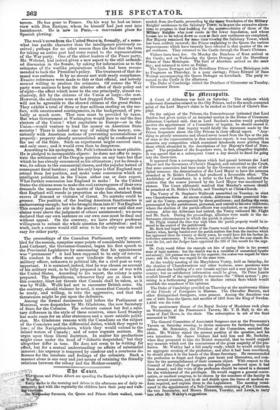The week's newsfroni the United States is, formally, of a
some- what less pacific character than the intelligence preiriously re- ceived ; perhaps for no other reason than the fact that the turn for taking an active part had come round to the representatives of the War party. One of the ablest leaders of the Peace party, Mr. Webster, had indeed given a new aspect to the still unfinish- ed discussion in the Senate, by asking for information as to the estimates of the warlike preparations which had been recom- mended to back the Presidents policy. The treatment of that de- mand was curious. It by no means met with ready compliance. Evasive references were made to this or that official, and nobody seemed willing to produce the estimates. Of course the War party were anxious to keep the ulterior effect of their policy out of sight—the effect which must be the one principally, almost ex- clusively, felt by the citizens of the Union at large—the cost. However, the estimates were at last dragged forth. Their aspect will not be agreeable to the shrewd citizens of the great States. They exhibit a total of three or four millions sterling on the sur- face, with unestimated contingencies, in the background, of pro- bably as much more. That sum must be provided by taxes. But what Government at Washington would dare to tax the free electors of the Union ? what capitalists in Europe—or in the Union—would venture to lend the money on American State security I' There is indeed one way of raising the money, con- sistently with American notions of preventing accumulations of property :property already accumulated might be confiscated to the use of the State. Such an experiment might succeed once, and only once; and it would even then be dangerous. According to his apologists, Mr. Polk's situation is most pitiable. He is pledged to incompatible objects: he dares not offer to nego- tiate the settlement of the Oregon question on any basis but that which he has already announced as his ultimatum ; yet he dreads a war, its odium to the commercial classes, and the popular hatred of consequent fiscal burdens; and his only hope is that England may retract from her position, and make some concession which no intelligent politician in the Union either can or does expect. What further concession has England to make ? In the United States the citizens seem to make the cool extravagance of their own demands the measure for the merits of their claim, and to think that England will recede in proportion as she has abstained from excess of demand or violence of threat. No mistake could be grosser. The position of the leading American functionaries is embarrassing enough; but who brought them into it? Not England. This country made no stir in the matter ; we never said that our claims were above the judgment of others uninterested ; we never declared that our own sentence on our own case must be final and without appeal. On the contrary, we have always professed willingness to submit the whole question for arbitration : and in truth, such a course would still seem to be the only one safe and easy for either party.


























 Previous page
Previous page